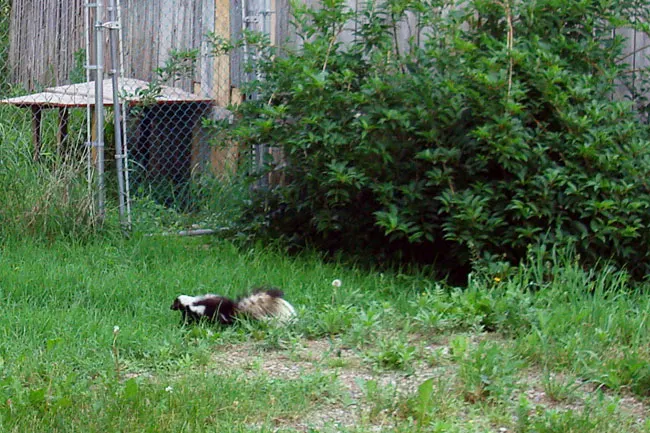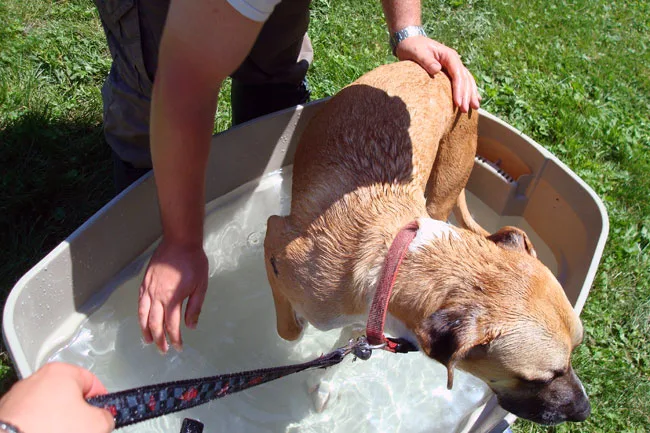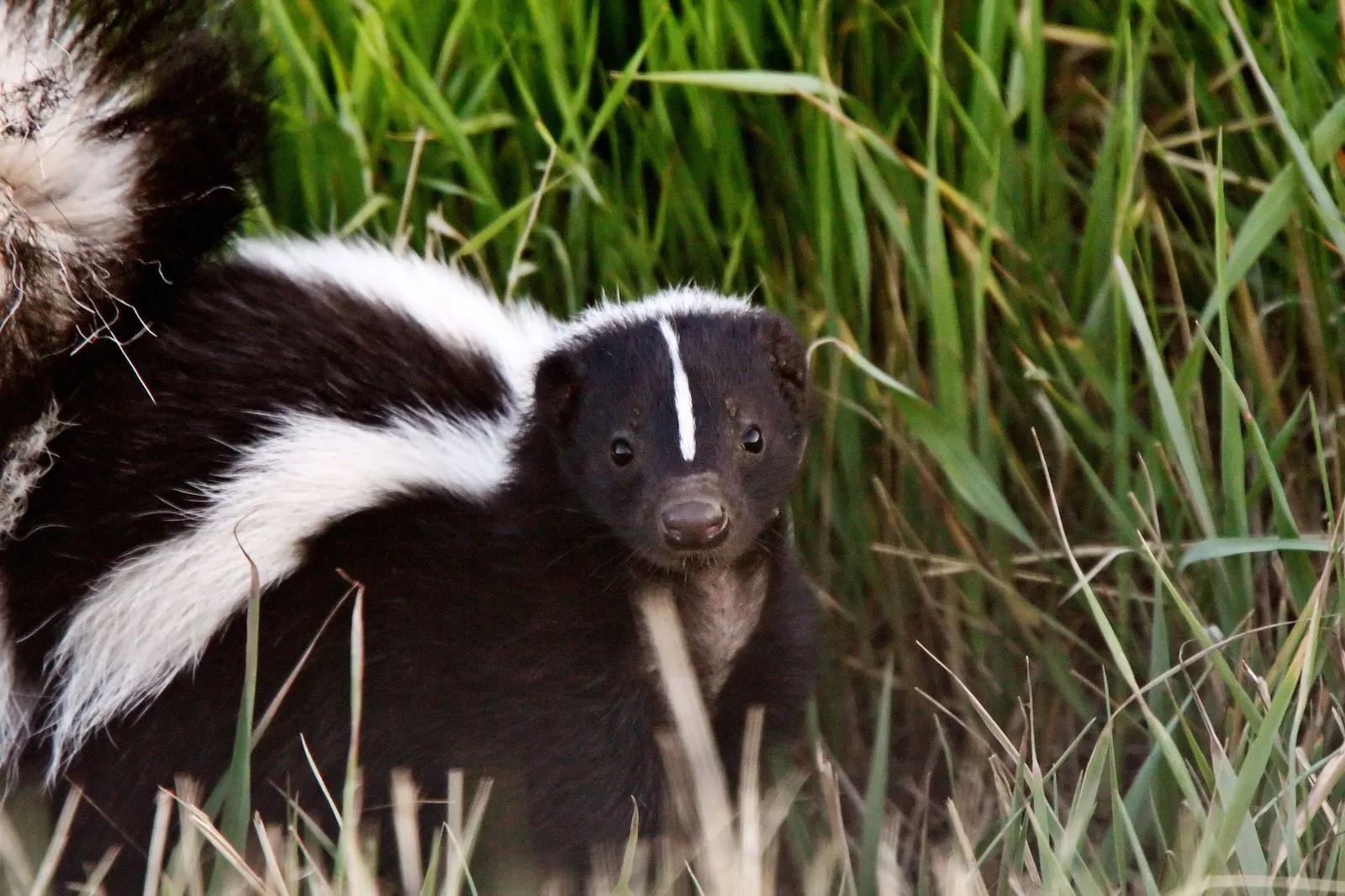Baxter and I headed out for our walk early one fall morning. It was cool and dark. I held the leash loosely as we walked across the driveway. All of a sudden, Baxter lunged. I saw a flash of white and then it hit me. A wave of the most acrid, offensive smell I’ve ever smelled.
We had just been sprayed by a skunk.
What to do if your dog is sprayed by a skunk
Many dog owners go through the unpleasant experience of having their dog sprayed—some like me get to experience it up close and personal themselves. Here are some tips on what to do if your dog gets sprayed by a skunk.
1. Separate your dog from the skunk
If you see a skunk or if your dog is sprayed, separate him from the skunk immediately. The spray is usually sufficient deterrent for most dogs, but do not allow your dog to approach or chase the skunk.
Skunks can bite or claw in defense. And they sometimes carry rabies. Keep your dog safe—albeit smelly—by ensuring he stays away from the skunk.

2. Your house will stink if you let your dog in the house
Skunk spray is incredibly strong. It penetrates fabric, hair and skin and is very hard to remove. Bringing your dog into the house will transfer the oily spray onto other surfaces and spread the smell.
One of our friends, Christine, learned this the hard way. She had let her dog, Mackenzie, out in the backyard first thing in the morning and didn’t realize Mackenzie had been sprayed by a skunk until her dog ran passed her into the house.
Christine panicked and locked Mackenzie in the bedroom. “Big mistake,” she says. “She started spreading that awful skunk oil everywhere… I spent many hours cleaning, scrubbing and pinching my nose. It was traumatic.”
3. If it happens on a hike, protect the interior of your car
If you’re away from home—for example, on a hike in the woods—and need to load your stinky dog into your car, try to find ways to protect your seats or interior.
Floor mats can make impromptu seat covers. Perhaps you have an old towel or an emergency blanket.
Cover as much as you can, but be prepared that, like Christine, you may have some heavy-duty cleaning in your future to remove the stench.
4. How to get skunk smell off your dog
Later, rinse and repeat … and repeat … and repeat!
Washing a dog who has been skunked is a bit more involved than a regular bath. Your usual dog shampoo will not be sufficient to combat the odor. Special de-odorizing cleaners are available, or you can make your own.
The professional solutions may be more effective or convenient than homemade—choose the method that is seems right for you.
DIY solution to remove skunk odor
The solution that worked for us with Baxter and Christine with Mackenzie was:
- hydrogen peroxide (4 parts)
- baking soda (1 part)
- and dish soap (1 teaspoon)
You’ll find many recipes for this cleanser online. The ratios vary slightly, but we used about four parts peroxide to one part baking soda, with about a teaspoon dish detergent. (Many recipes specify Dawn, but our regular dish soap worked fine.)

We scrubbed the solution into Bax’s fur, trying to find every spot he’d been sprayed. Skunk spray is very oily, so it takes extra effort to remove. For many dogs, their heads and faces take the brunt of the spray. Be careful washing around your dog’s eyes and mouth, as the peroxide and soap could damage his eyes.
Rinse your dog with clean water. Repeat the peroxide-baking soda-dish soap bath as many times as needed. (I think we did about six baths in one day.)
Christine also made a paste from baking soda, water and liquid soap for carpet, her bed and her dog’s bed. She recommends dumping baking soda into the washing machine with any laundry.
Be prepared that even if you did not get sprayed, the smell will transfer to you. Wear gloves and old clothes that you can throw away after bath time.
Also know that water often rekindles the skunk smell, so if your dog gets wet later, he may smell skunky again! Repeat the de-odorizing bath as needed.
Note that hydrogen peroxide is also good to keep on hand if you ever have to induce vomiting in your dog. Hopefully you’ll never need to do this!
5. Watch for distress after your dog is sprayed by a skunk
Complications from skunk spray are rare but do sometimes occur. Spray in the mouth can cause nausea or vomiting. Some dogs may start foaming at the mouth after being sprayed by a skunk. Skunk spray can also sting and burn a dog’s eyes.
Baxter’s immediate reaction after being sprayed was to writhe and rub his head along the ground, trying to get the spray out of his eyes. Rubbing can cause secondary injury, so flush your dog’s eyes with clean water or saline eyewash to ease the burning as soon as possible.
Is skunk spray poisonous to dogs?
The spray from a skunk contains 7 different sulfur containing chemicals, according to Dr. Diane Tortorice, a veterinarian with Valley Cottage Animal Hospital in Valley Cottage, N.Y. In most cases, she said the dog will rub his face, roll, sneeze or vomit if he’s been sprayed in the face. However, in rare cases a more serious reaction could occur.
In most instances, we believe dogs will not need to see a vet after being sprayed by a skunk. However, if your dog exhibits any concerning symptoms, from his eyes to his skin to his overall demeanor, we recommend you consult your vet right away.
6. Accept a bit of “eau de skunk”
The smell of skunk can linger.

Or, as Christine says, “You’ll smell it for weeks to come. It won’t be overwhelming or potent like when he or she got sprayed, but you’ll smell it. Just admit defeat and accept it.”
Despite your best efforts to clean your dog and yourself and to keep the smell out of your house and car, you may catch a whiff of skunk for awhile after the incident especially when you get up close and personal with your dog.
7. Replace your dog’s collar and leash.
One helpful step can be to replace your dog’s collar and leash, as it can be very difficult to eliminate the smell from them.
How to prevent your dog from being sprayed by a skunk
There are steps you can take to prevent your dog from being sprayed by a skunk in the first place.
First, watch out. Pay attention to your surroundings and look for that distinctive white stripe.
Second, channel your inner pooch and use your nose. If you think you smell a skunk, be extra vigilant about keeping your dog close to you.
Mackenzie has been sprayed several more times since Christine’s first traumatic incident. So Christine now advises, “Before you let your dog outside, stick your nose out and have a quick sniff. If you smell something funky, save yourself the trauma and keep your dog inside.”
Another helpful step is to understand the skunk lifestyle. Skunks tend to be most active at dawn and dusk, so keep watch when you’re out with your dog at those times of day. Don’t leave pet food or garbage outside where it might attract skunks. Skunks like to burrow, so block off spaces underneath decks and remove piles of wood, brush or debris that may appear particularly cosy.
It’s been about six years since Baxter and I were sprayed by a skunk.
Fortunately, we’ve not repeated the experience! But you can see from this article that it made an impression on me. By following these tips, you and your dog will hopefully get through any skunk encounters as painlessly as possible—or ideally prevent encounters entirely.
- Have you or your dog been sprayed by a skunk?
- What’s the worst wildlife encounter you’ve had?
- Any tips for dealing with eau de skunk?
Julia Thomson is a blogger at Home on 129 Acres where she writes about her adventures of country living and DIY renovating. She and her family live on a 129-acre farm in Ontario, Canada.
Related posts:
How to keep your dog safe around coyotes
My dog was attacked by a coyote

Meg Sheridan
Tuesday 17th of December 2019
Both my mastiffs (now deceased from old age) were sprayed by skunks twice! The smell is awful. They seemed pretty unphased by it though. I keep a product called “Skunk Off” on hand just in case my Malinois encounters one. We live in a rural setting so they wander by sometimes. The product comes in a shampoo and a spray that you can just leave on. It works great!
Lindsay Stordahl
Tuesday 17th of December 2019
Thank you for that tip!